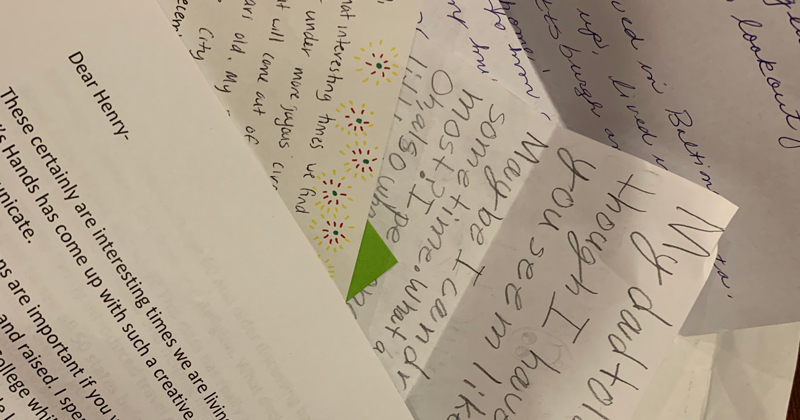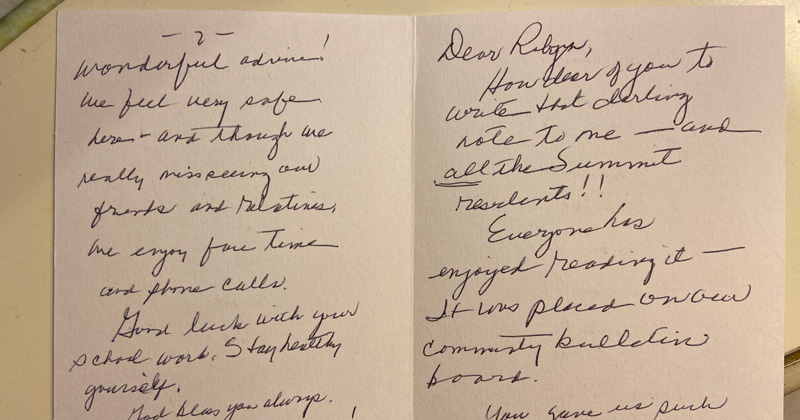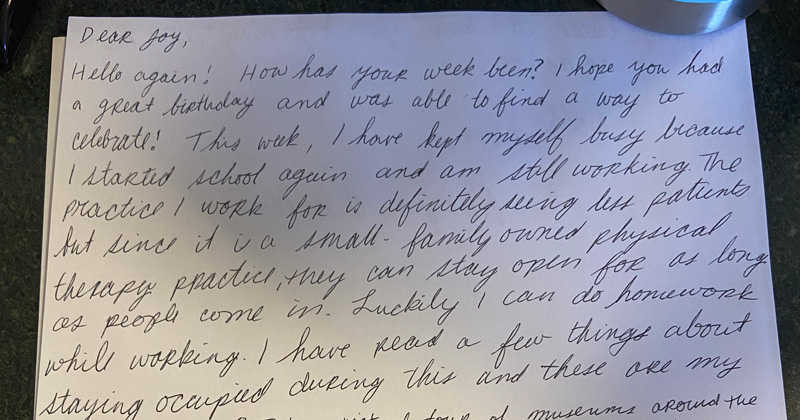


Helping with healing words
Photo courtesy of Lori’s Hands and Robyn O’Halloran May 04, 2020
UD-based pen pals ease isolation of Delaware’s older adults
In these strange days of semi-solitude, people are scrambling for ways to connect to the world. They text and tweet, they post and prowl through Facebook, they gather shoulder-to-shoulder in glitchy Zoom-rooms, happy to endure the slightly chilly virtual touch for a few moments of human warmth.
It’s enough to make some people yearn for an old-fashioned letter from a friend.
That’s exactly the kind of connection that’s making a big difference for Delaware’s many older adults now homebound by the coronavirus (COVID-19) pandemic, who have been getting words of hope delivered to their door thanks to groups of committed volunteers from the University of Delaware community.
At Lori’s Hands, a UD-born nonprofit dedicated to giving in-person volunteer assistance to older residents, organizers pivoted swiftly to “snail mail,” texting and phone chats as a means to sustain support to clients. And from her living room in Havertown, Pennsylvania, Robyn O’Halloran is enlisting roommates and classmates in a grassroots “pen pal” campaign with seniors.

Day by day, the letters’ looping, youthfully cursive lines of support are easing the anxiety of isolated lives, and teaching new lessons in benevolence. “They said they get really excited to get them, and they check their mail for more letters,” O’Halloran said. “The letters that we have gotten back have been so kind and sweet.”
Lori’s Hands volunteer Rachel Titus, a health behavior science junior, is now sequestered and scribbling in Landenberg, Pennsylvania.
“It has definitely given me a greater awareness,” Titus said. “It changed my perspective on the field of health care, that it’s more than just medicine, it’s the connections you have with people and the effect you’re having on their lives.”
Since the virus shutdown, Lori’s Hands has recruited 145 student and non-student volunteers to participate in the pen pal program. The letter campaign also has encouraged Lori’s Hands to expand volunteer participation outside of campus, though they know their messages only partly mitigate the loss of services the group typically provides — like grocery shopping, prescription pickup and other household chores.
“This moment has highlighted the need that we know is always there,” says Sarah LaFave, a UD nursing graduate who still helps oversee the group she founded as a sophomore after losing her mother, Lori, to cancer. Last year, Lori’s Hands drew 347 student volunteers, who gave 6,192 hours of service to 142 people with chronic disease. More than 70 percent of those people live alone, and their average age is 77.

Since the virus shutdown, the group has added more than 100 non-student volunteers, bringing the total to 170. “We’ve got people writing from Canada, from Texas, from Florida, from all over,” said LaFave, now a doctoral nursing student at Johns Hopkins University. “We’re right on the cusp right now of writing grants with other communities, in Delaware and beyond, to start Lori’s Hands services in other locations,” and have joined a statewide initiative to support older adults during the crisis by training other volunteers.
In such times, it doesn’t matter much that the support comes in the form of seemingly mundane conversations — updates on classes, dishing with penpals over students’ roommate dramas. “I personally tell them a little, but about myself,” said O’Halloran, a junior environmental engineering major running her own pen-pal campaign from the Newark home she still shares with UD roommates.
To find older adults interested in getting letters, she and her team ask around on social media sites like Nextdoor.com. “I also ask the people who gave me their address about things the recipient likes to do. If they like to garden, I ask them about that, or tell them about books I’ve read,” O’Halloran said. “The first week I enclosed a cookie recipe with it. It’s something they can try that’s new. One of the people sent back their own cookie recipe.”
Lori’s Hands volunteers are trained to supplement the casual tone of calls and letters with helpful tips on coping during the crisis, giving seniors ways to pass the lonely hours constructively. Lunch dates that once took place in residents’ homes have shifted to video chats, and the impact of the letters is even reaching beyond the original recipient. One older adult told Titus that she has been sharing her letters with neighbors and friends on the phone.
“How dear of you to write that darling note to me — and ALL the [facility] residents,” one elderly client responded to Titus. Another got answers from Titus about how she might get her groceries delivered online. “That was relieving for her,” Titus said. “We don’t expect money in return, we don’t get paid, so it’s nice for a person who doesn’t have all the money in the world to get things delivered.”
Volunteers have also been working to connect residents with food resources like Meals on Wheels and food pantries, occasionally helping foot grocery-delivery fees through Lori’s Hands’ “Sunny Day” fund, said Maggie Ratnayake, director of the group. Lori’s Hands is also partnering with other nonprofits on a new statewide initiative, the Delaware Neighbors Network, which is supporting older adults statewide during the crisis. “We’re currently writing grants with partners in other communities in Delaware and in other states to start Lori’s Hands services in other locations,’ LaFave said.
“Some of our clients do have family they’re in touch with regularly, but many of our clients don’t,” Ratnayake said. “Either way, this is a very isolating time and they appreciate those letters and calls so much. They like knowing they can turn to us if they need anything.”
Or, as one grateful recipient wrote to Lori’s Hands: “I miss my weekly ‘elves,’ but just love how they’re only a phone call away.”
Contact Us
Have a UDaily story idea?
Contact us at ocm@udel.edu
Members of the press
Contact us at 302-831-NEWS or visit the Media Relations website

